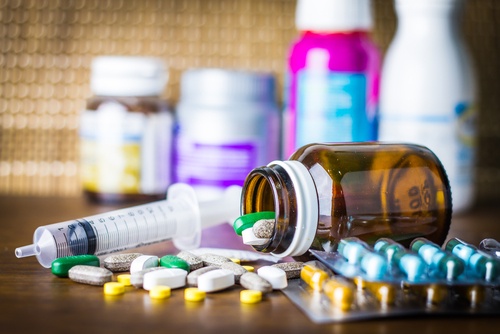Share this
why are immunosuppressive therapy drugs on the rise?
by Neoteryx Microsampling on Feb 24, 2020 7:00:00 AM
 Over the past five decades, the medical community has witnessed considerable advancements in organ transplants. Patients receive organs, and by following a post-transplant regimen of immunosuppressive drugs, their bodies can accept the organ.
Over the past five decades, the medical community has witnessed considerable advancements in organ transplants. Patients receive organs, and by following a post-transplant regimen of immunosuppressive drugs, their bodies can accept the organ.
Therefore, the use of immunosuppressive therapy drugs has been on the rise, reaching its peak in 2020. But there must be a reliable method for monitoring the use of these drugs and their effects.
This is because, although immunosuppressive medications are helping the body accept the transplanted organ, there are various side effects. These must be tracked via therapeutic drug monitoring, or TDM.
Side effects Associated with the Use of Immunosuppressive Drugs
Among the side effects associated with the use of these drugs are:
- High Blood Pressure: The normal functioning of the body is affected by a slowed immune response. This can also cause high blood pressure.
- Hyperglycemia: Immunosuppressive agents may tamper with the body’s way of managing blood sugar. As a result, there is increased sugar in the blood, also known as hyperglycemia.
- Osteoporosis: Osteoporosis occurs when there is an increased risk of bone fracture in your body due to decreased bone density. Some antirejection medications like corticosteroids will cause osteoporosis. The resultant fractures are more common at the spine, wrist, and hip.
- Weakened Immune System: Many types of immunosuppressant agents like tacrolimus work to lower the immune system to avoid fighting the new organ that has been introduced. This weakens the entire body’s immune system, opening doors to virus and fungal infection.
Other side effects may include kidney and liver problems and increased chances of uncontrolled bleeding. If you’re receiving immunosuppressive therapy, it is crucial for you to avoid anyone who is actively sick. This is because your immune system is at its lowest and you may get the infection as soon as you come into contact with the person.
Some side effects like osteoporosis may be averted through vitamin D and calcium supplements. Exercise can always help. It is vital for individuals taking immunosuppressive medications to monitor their health closely. This way, they can identify any changes before they become more challenging to handle.
Immunosuppressive therapy and therapeutic drug monitoring are an integral part of the healing process for an organ transplant patient. It is up to both the patient and the physician to monitor progress for a successful recovery.
Adapting innovative models like remote patient monitoring allows for smart, simple and safe remote sampling from the comfort of home, without the need to go to a clinic. The home-collected samples can be sent via regular mail to the clinical lab or toxicology lab for analysis, and the care team can follow up to adjust the immunosuppressive therapy as needed.
More information about microsampling for TDM can be found via our Microsampling for Drug Monitoring page. 

Image Credits: Trajan, Neoteryx, Shutterstock
Share this
- Microsampling (206)
- Research, Remote Research (119)
- Venipuncture Alternative (105)
- Clinical Trials, Clinical Research (83)
- Mitra® Device (73)
- Therapeutic Drug Monitoring, TDM (51)
- Dried Blood Spot, DBS (39)
- Biomonitoring, Health, Wellness (30)
- Infectious Disease, Vaccines, COVID-19 (24)
- Blood Microsampling, Serology (23)
- Omics, Multi-Omics (21)
- Decentralized Clinical Trial (DCT) (20)
- Specimen Collection (18)
- Toxicology, Doping, Drug/Alcohol Monitoring, PEth (17)
- Skin Microsampling, Microbiopsy (14)
- hemaPEN® Device (13)
- Preclinical Research, Animal Studies (12)
- Pharmaceuticals, Drug Development (9)
- Harpera Device (7)
- Industry News, Microsampling News (5)
- Antibodies, MAbs (3)
- Company Press Release, Product Press Release (3)
- Environmental Toxins, Exposures (1)
- July 2025 (1)
- May 2025 (1)
- April 2025 (2)
- December 2024 (2)
- November 2024 (1)
- October 2024 (3)
- September 2024 (1)
- June 2024 (1)
- May 2024 (1)
- April 2024 (4)
- March 2024 (1)
- February 2024 (2)
- January 2024 (4)
- December 2023 (3)
- November 2023 (3)
- October 2023 (3)
- September 2023 (3)
- July 2023 (3)
- June 2023 (2)
- April 2023 (2)
- March 2023 (2)
- February 2023 (2)
- January 2023 (3)
- December 2022 (2)
- November 2022 (3)
- October 2022 (4)
- September 2022 (3)
- August 2022 (5)
- July 2022 (2)
- June 2022 (2)
- May 2022 (4)
- April 2022 (3)
- March 2022 (3)
- February 2022 (4)
- January 2022 (5)
- December 2021 (3)
- November 2021 (5)
- October 2021 (3)
- September 2021 (3)
- August 2021 (4)
- July 2021 (4)
- June 2021 (4)
- May 2021 (4)
- April 2021 (3)
- March 2021 (5)
- February 2021 (4)
- January 2021 (4)
- December 2020 (3)
- November 2020 (5)
- October 2020 (4)
- September 2020 (3)
- August 2020 (3)
- July 2020 (6)
- June 2020 (4)
- May 2020 (4)
- April 2020 (3)
- March 2020 (6)
- February 2020 (3)
- January 2020 (4)
- December 2019 (5)
- November 2019 (4)
- October 2019 (2)
- September 2019 (4)
- August 2019 (4)
- July 2019 (3)
- June 2019 (7)
- May 2019 (6)
- April 2019 (5)
- March 2019 (6)
- February 2019 (5)
- January 2019 (8)
- December 2018 (3)
- November 2018 (4)
- October 2018 (7)
- September 2018 (6)
- August 2018 (5)
- July 2018 (8)
- June 2018 (6)
- May 2018 (5)
- April 2018 (6)
- March 2018 (4)
- February 2018 (6)
- January 2018 (4)
- December 2017 (2)
- November 2017 (3)
- October 2017 (2)
- September 2017 (4)
- August 2017 (2)
- July 2017 (4)
- June 2017 (5)
- May 2017 (6)
- April 2017 (6)
- March 2017 (5)
- February 2017 (4)
- January 2017 (1)
- July 2016 (3)
- May 2016 (1)
- April 2016 (2)

No Comments Yet
Let us know what you think